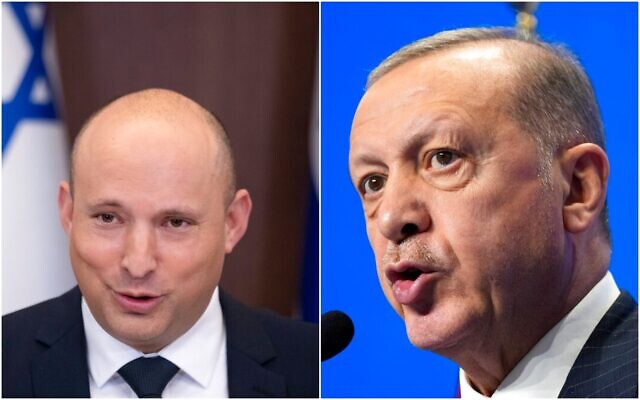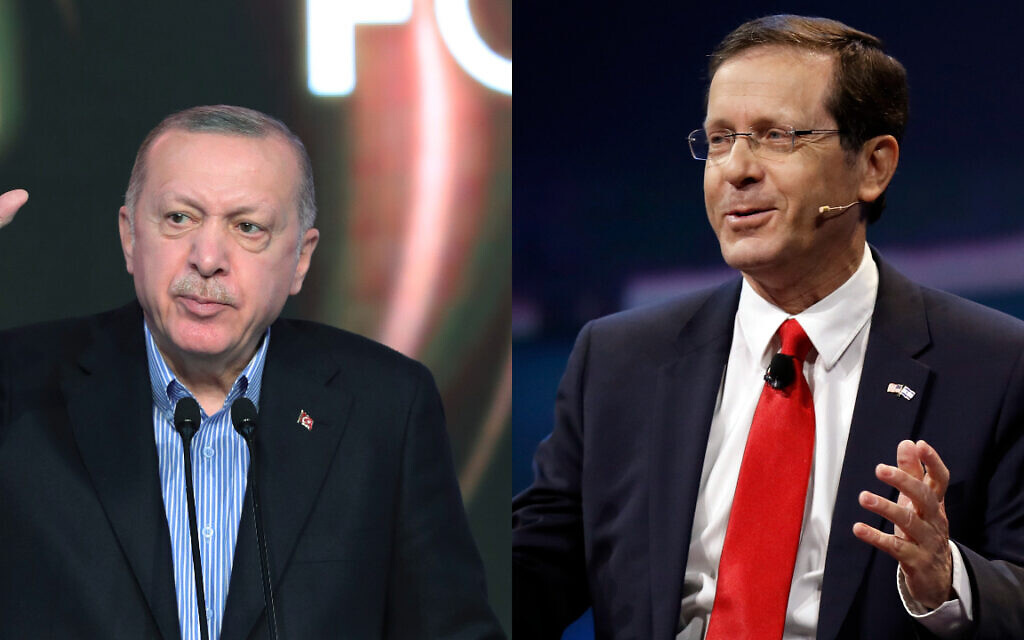President Isaac Herzog spoke with Turkish President Recep Tayyip Erdogan on Sunday evening, ahead of a possible meeting between the two leaders, the latest sign of warming relations between the countries.
According to a press release issued by the president’s office, Herzog wished Erdogan a speedy recovery after the Turkish president tested positive for COVID-19, along with his wife, the day before.
Erdogan thanked Herzog for his concern for his welfare. The two leaders also discussed the possibility of meeting soon, the press release said.
The phone call represents a recent shift in Erdogan’s public policy toward Israel, with the Turkish president signaling a different approach and a desire to rekindle relations with Israel in recent months.
On Friday, Erdogan said Turkey and Israel could work together to deliver natural gas from the Middle East to Europe, and the two countries would discuss energy cooperation at talks next month.
Turkey is currently being hit by an economic crisis, while Israel and a group of countries in the region, including Turkey’s rival Greece, are working on a joint pipeline to bring gas from the eastern Mediterranean to Europe. , under an agreement signed in January 2020.
Former Prime Minister Benjamin Netanyahu (R), Greek Prime Minister Kyriakos Mitsotakis (C) and Cypriot President Nikos Anastasiadis shake hands in Athens on January 2, 2020, before the signing of an agreement for the EastMed gas pipeline project to ship gas from the eastern Mediterranean to Europe. (Aris Messins/AFP)
Turkey has strongly opposed the project and asserted its own territorial claims to the region’s energy wealth.
After the Biden administration dropped support for the controversial pipeline last month, Erdogan signaled he wanted Turkey involved in importing Israeli gas to Europe, saying there had been ‘some progress’ on the issue in the past, and suggesting a new project that would involve Ankara.
But despite Erdogan’s efforts, Israeli officials quoted by Haaretz last week said better relations with Turkey would not come at the expense of Israel’s alliance with Greece and Cyprus, who were reportedly already aware of this possibility.
“These two countries did not oppose a warming of relations [with Turkey]. Israel has made it clear that security cooperation with them will continue and they themselves are advancing dialogue with Erdogan,” an official said.

Prime Minister Naftali Bennett (L) and Turkish President Recep Tayyip Erdogan. (Composite/AP)
Erdogan previously told Turkish media that he would welcome Herzog for an official visit in mid-March as part of efforts to revitalize once strong relations between the two countries, but this has not been confirmed and a Herzog’s word had declined to comment on Erdogan’s announcement. .
Last week, an Israeli official quoted by Haaretz described the potential meeting between Herzog and Erdogan as an indicator of the Turkish president’s intentions.
“A presidential-level meeting is… a tool that can be used,” he said. “The president is a symbolic figure, not a political one, and in any case, Herzog is conducting his own talks with the Turks. One can start with such a channel and then check out developments and implications, all at a slow pace.
Erdogan has “demonstrated his seriousness” in improving relations with Israel in several ways, the official said, citing the release of Natali and Mordy Oknin, an Israeli tourist couple arrested in Turkey last year for alleged espionage, and efforts to restrict the activities of Hamas. in his country.
And in another symbolic attempt to signal his shift in attitude toward the Jewish state, Erdogan hosted a delegation of prominent rabbis from Jewish communities across Turkey in late December at his presidential palace in Ankara.
During their visit, he spoke of the importance of improving relations with Israel, which he described as “vital for the security and stability of the region”, noting that despite differences with Israel over its policy towards Palestinians, “Turkey’s relations with Israel in the fields of economy, trade and tourism are progressing in their own way.
Times of Israel staff contributed to this report.

